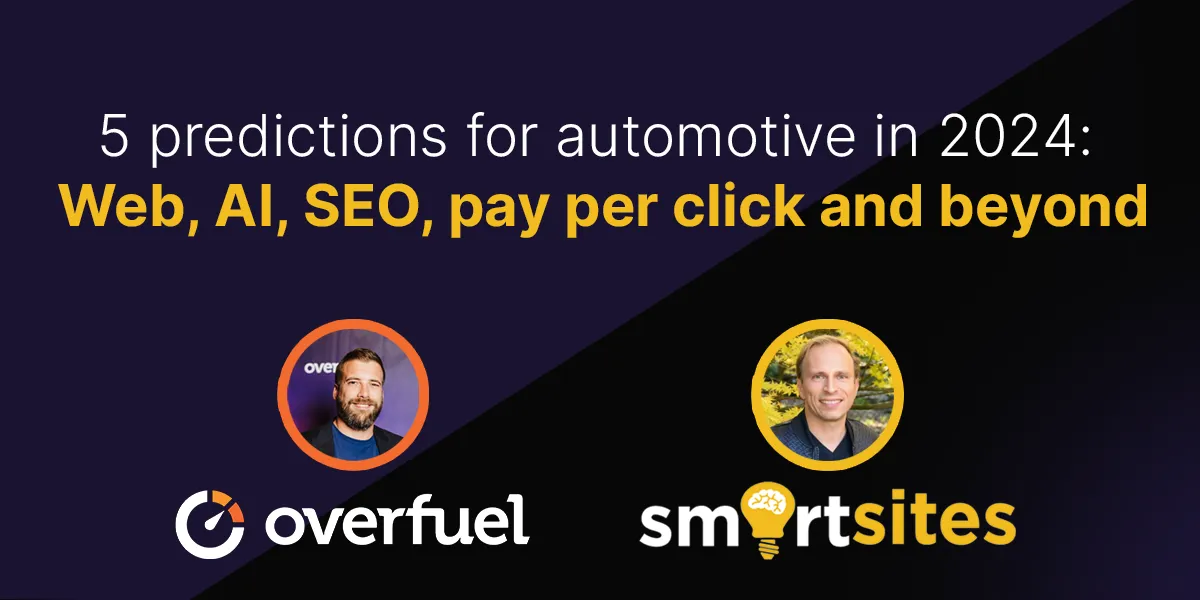5 predictions for automotive in 2024: Web, AI, SEO, pay per click and beyond
Alex Griffis December 13, 2023

As we gear up for 2024, we thought it’d be fun to collaborate with one of the best and brightest digital marketing specialists in automotive: Alex Melen, the co-founder of SmartSites. In collaboration with our very own Alex Griffis, we’ve outlined 5 predictions for automotive in 2024. How much of an impact will AI have? Will the pay-per-click cost surge continue? What does 2024 hold for dealerships and their digital presence? Let’s jump in.

Alex M: “Pay-per-click pricing will likely continue to increase”
Throughout 2023, did you have noticeable increases in MoM PPC costs? We certainly did, across the board.
Having run PPC campaigns since 2000 (when I was paying 5-10 cents a click for most keywords!), I can confidently say that the cost per click on Google will continue to increase in 2024. In fact, every year, the CPCs increase for various reasons, including increased spending and the platform’s competitiveness.
However, one of the reasons it continues to be so competitive is because it continues to perform so well. Google (and search in general) continues to be one of the best platforms for targeting intent without reliance on third-party data or making assumptions.
What do I mean by that? Instead of trying to figure out if someone is in the market for a Porsche Taycan or JUST purchased a Porsche Taycan, with Search Marketing, the users themselves identify their intent with a search like “porsche taycan lease specials”. Yes, PPC costs will continue to increase, and yes, PPC will continue to be one of the best platforms for advertising (especially in automotive).
Of course, this doesn’t even get into the discussion of Google’s upcoming final rollout of the Search Generative Experience, which will start featuring more AI responses and less organic (or paid) results. In other words, ranking in the top position for both paid and organic will be more critical than ever. And, of course, as the entire market becomes more competitive, being on top of your game with PPC campaigns will be crucial to generating ROI from your search marketing.

Alex G: “AI-based products will continue to surge and many will fail”
There’s no denying that artificial intelligence (AI) is all the rage right now, and many software companies are racing to offer AI-based solutions. There’s just one challenge: consumers generally trust websites but not AI. Storyblok, a content management system (CMS), revealed that 85% of consumers aren’t interested in using AI to help them make a purchase.
I want to build AI-powered products as much as the next person, but we’re missing the fundamental question of “What are we trying to solve”? In the AI gold rush, I’d argue the urgency to get to market overshadowed the importance of developing a great customer experience.
AI can significantly impact car shopping and automotive websites, but throughout 2024, we’ll see several shifts in focus through trial and error. There are subtle ways I see AI making an outsized impact, like content generation or enhancing inventory, that may be more impactful than apparent things like chat or voice bots.

Alex M: “Generative AI has the potential to be impactful–if used correctly”
I wrote my book on search marketing just a month shy of the explosion of ChatGPT, and it was done the old-fashioned way: one click at a time. In my book, I briefly mention the coming Generative AI revolution; however, I assumed that Google would not only devalue AI-generated content but also label it as such. Considering that even free tools can identify AI-generated content, it’s a no-brainer that Google, which purchased DeepMind in 2014, would easily be able to identify and label (and potentially penalize) AI content.
However, in February of this year (2023), Google came out with their guidance saying that they will continue to treat content following their current guidelines (following the EEAT model), regardless of how it was created. That said, Google continues to reward content based on Experience, Expertise, Authoritativeness, and Trustworthiness. In most cases, AI-generated content will not meet that criteria and will naturally be devalued in search results.
With that said, Generative AI can be used to help create content ideas, generate first drafts of content, and so forth. For 2024, I believe this new approach should gain traction, and Generative AI will become a tool to help create content. However, Generative AI should not be used to create mass/spam auto-generated content.

Alex G: “Website speed and performance will become increasingly important”
According to a benchmark report by Wattspeed, only 39% of automotive websites meet Google’s recommended speed standards, particularly on mobile devices, ranking the automotive sector as the second-worst performer of all industries. Here’s why underperformance presents a big challenge for dealerships of any size:
- 80% or more of website traffic originates from a mobile device.
- For every second a website takes to load, conversion can fall by up to 20% (SOASTA Research)/
- As third-party automotive websites grow in popularity (12% YoY) compared to dealership websites (2% YoY), dealers face increasing competition.
In Rick Viscomi’s brilliant write-up, A faster web in 2024, he highlights the case study whereby solving speed issues and website layout stability, Shopify decreased their bounce rate by 4% and increased conversion rates by 6%. It’s just one of many case studies empirically proving what we already know: website speed matters, and the automotive industry would benefit significantly from addressing the elephant in the room.
Conventional wisdom says that website performance issues can’t be solved and that manufacturer requirements and third-party plugins have become too burdensome. But in reality, if you look at the data, the top 3 performance issues on websites are typically within the control of the website vendor.
There are strategies for handling third-party plugins. There are optimization techniques to cut over 90% of the load time from a website. It’s not rocket science–it’s just not been a priority. By addressing speed and performance, dealerships have a real opportunity to 2-3x their traffic by simply following best practices.

Alex G: “2024 may be the year we see a significant decline the use of live chat products”
There’s no question that real-time chat has taken over, but therein lies the issue: real-time. Research conducted by HubSpot revealed that 66% of customers expect an immediate response to their inquiries. Most dealerships, barring those with large BDR departments, often fail to meet the consumer’s expectations of responsiveness.
More importantly, it’s time to acknowledge that live chat products are annoying. Our research project at Overfuel found that the “close” button on live chat is the #1 most-clicked element on a vehicle detail page, accounting for over 20% of all clicks. Based on analytics data, it’s safe to say that if a customer wants to engage with you, they will figure out how. Live chat aside, the remainder of the top 10 most-clicked elements on a vehicle page are lead-generating: click-to-call, customize your payment, etc.
Don’t get me wrong–live chat products perform well when executed well. For 2024 and beyond, however, I think we’ll see a more significant shift to text messaging for two reasons:
- Text messaging is the preferred communication channel for millennials
- The stakes are lower because the expectations are more relaxed
About Alex Melen
Alex Melen is an award-winning entrepreneur, keynote speaker, best-selling author, and early digital pioneer. He is the co-founder of SmartSites, a digital marketing agency that has grown from a handful of digital visionaries to a team of over four hundred full-time employees, spanning six offices worldwide.
About Alex Griffis
Alex Griffis is a seasoned software and product leader with a track record of building enterprise SaaS applications, working with brands like Disney, Best Buy, Home Depot, among other Fortune 500 companies. He is the President and CTO of Overfuel, a mobile-first website platform with advanced analytics and digital retailing.